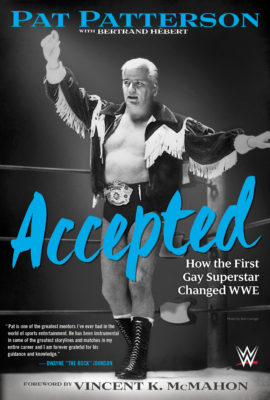Pro wrestling is inherently homoerotic. As a boy watching wrestling on TV, the sight of these muscle-bound, oiled-up men grappling with each other caused some strange stirrings – and I’m straight. There have also been gay wrestling characters through the ages – Gorgeous George in my parents’ generation, Adorable Adrian Adonis in mine – who played up mincing stereotypes for villainous effect.
But Montreal’s own Pat Patterson is the real deal: a veteran wrestler (he was in the ring through the sixties and seventies before becoming a behind-the-scenes ideas man with WWE, which he remains to this day) who was openly gay, at least within the industry, from the start. And as indicated by the title of his memoir, Accepted, his sexuality was never an issue in the outwardly macho wrestling world. With an introduction by WWE head honcho Vince McMahon and a cover blurb from wrestler-turned-movie star Dwayne “The Rock” Johnson, the book shows this acceptance is real.
Born into a working-class Montreal family with eight siblings, Patterson (who changed his name early on from Pierre Clermont) left home at seventeen after his father refused to accept his coming out. Despite barely speaking any English, he moved to the United States and began his wrestling career in desperately hardscrabble circumstances; his early years on the road give the book some of its most colourful stories. Early on, he met the love of his life, Louie Dondero; the two would remain a couple for forty years.

Accepted
How the First Gay Superstar Changed WWE
Pat Patterson and Bertrand Hébert
ECW Press
$27.95
cloth
272pp
9781770412934
Celebrity autobiographies are usually “co-written” with a professional writer (in this case, local wrestling scribe Bertrand Hébert), whose role is often to transcribe spoken recollections, ask follow-up questions, and shape the stories into a more or less coherent form, ideally in something resembling the subject’s voice. Keith Richards’s memoir is like listening to a charming old drunk spin yarns on a barstool for hours. (David Lee Roth’s is like that as well, except he’s the guy you want to run out of the bar to escape.) As captured by Hébert, Patterson’s tone is conversational, no-nonsense, profane, and inflected with the kind of linguistic idiosyncrasies that Quebec Anglophones will recognize. He refers at one point to wrestlers teasing him for not pronouncing the s on plural words, and intentionally or not, a few of these creep into the text (e.g., “all kind of” for “all kinds of”). The resulting voice is no one’s idea of smooth or literary, but it suits the subject and makes the book’s poignant moments that much more powerful.
Ultimately, the value of Accepted is twofold: as a goldmine for wrestling nostalgists, with its span from the fifties to today, and as an inspirational tale of Patterson’s life as a gay man in a less enlightened era. Even if he was accepted in wrestling, he had to open a lot of people’s minds, including those of his own family. The story of how he patiently worked hard to do so is touching, and his plain-spoken style just makes it all the more human. mRb






0 Comments